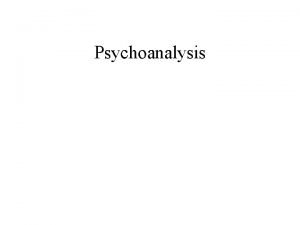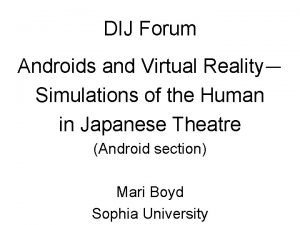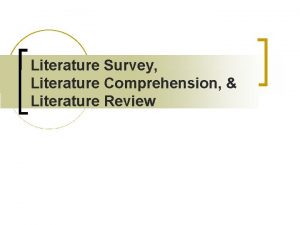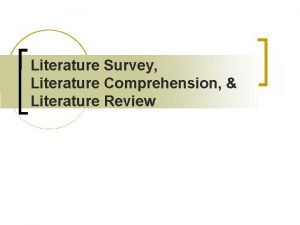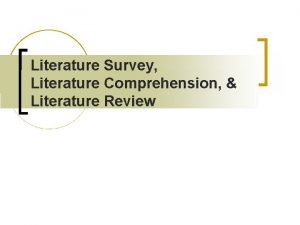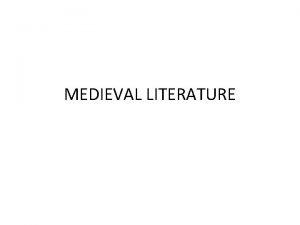The Uncanny Literature is uncanny The uncanny has










- Slides: 10

The Uncanny

Literature is uncanny! • The uncanny has to do with the sense of strangeness, mystery, eeriness. It particularly has to do with the unfamiliarity which appears at the very heart of the familiar, or else a sense of familiarity which appears at the very heart of the familiar. • The uncanny is not just a matter of the weird or spooky, but it has to do more specifically with the disturbance of the familiar. üWhat is paradoxical about the uncanny?

Literature is uncanny! • The uncanny has to do with how ‘literary elements’ and reality seem to merge with one another. • Uncanniness could be defined as occurring when ‘real’, everyday life suddenly takes on a disturbingly ‘literary’ or ‘fictional’ quality. • Literature itself can be defined as a discourse of uncanny.

Examples of the uncanny • You walk into a room in a house you have never visited before and suddenly you have the sense that you have been there before and that you even seem to know what will happen next. (Déjà vu) • When you are, for example, in a public place and you catch sight of someone whom you think looks rather disturbing, and then you realize you have caught sight of this person reflected in a window or a mirror and that person is yourself. (doppelgänger)

Why the uncanny is appealing to the Shkovesky? • Literature, for the Russian formalists, has to do with defamiliarization: it makes the familiar strange, it challenges our beliefs and assumptions about the world and about the nature of reality. It provokes a sense of uncertainty.

Forms of uncanny • Repetition: a strange repetition of feelings, situations, or even characters. It has two types; üThe sense that something has happened before. (déjà vu) üThe idea of the double (doppelgänger)

Forms of uncanny • Odd coincidence and, more generally, the sense that things are fated to happen. • Animism: a rhetorical term referring to a situation in which what is inanimate or lifeless is given attributes of life or spirit. • Anthropomorphism: a rhetorical figure that refers to a situation in which what is not human is given attributes of human form or shape.

Forms of uncanny • Automatism: a situation where what is not human is perceived as mechanical. • A fear of being buried alive or the act of burring someone alive. • Silence This idea is introduced by Freud by he himself is effectively silent on what makes it uncanny.

Forms of uncanny • Telepathy It occurs when your thoughts are perceived as not your own, however private or concealed you might have assumed them to be. • Death is familiar in the sense that ‘all what lives shall die’, but it is absolutely unfamiliar, unthinkable, and unimaginable. No one knows how people experience death or really and precisely perceives what happens after death.

Forms of uncanny • What is the relationship between literature and the uncanny? • List three uncanny elements and give examples on them from literary works you have already studied. • Explain how Russian formalists look at the uncanny.
